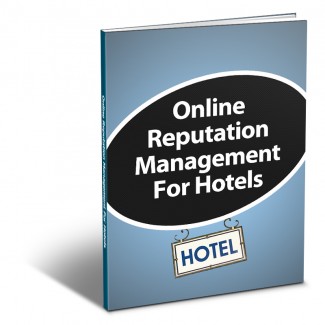 License Type: Personal Use
License Type: Personal Use  File Size: 7,968 KB
File Size: 7,968 KB File Type: ZIP
File Type: ZIP
 SKU: 54271
SKU: 54271  Shipping: Online Download
Shipping: Online Download
Ebook Sample Content Preview:
Why Does ORM Matter?
You might think that ORM isn’t really a matter of importance. Even if you were to get a bit of bad feedback online, you could either let it blow over, or if you needed to you could try and redress the balance with some discounts and marketing activity, right?
Dead wrong.
The global trade bodies for the travel industry have researched this extensively, and they have found that reputation management could not be more important. The first thing to note is that hotel rooms are entirely price un-elastic according to the latest research from The Owners Association . What that means is that a slowdown in bookings due to bad reviews cannot be countered with discounts. Extensive research has shown that any increase in the volume of sales driven by discounts is nowhere near enough to recover the lost original business.
But it gets more important than that. Market Metrix report that “past experience, reputation, recommendations and online reviews...are now more important to hotel guests than either location or price.” Moreover, the World Travel Market report notes that 35% of hotel customers in 2010/2011 changed their hotel selection after reading about them on social media sites.
Most hotels generate the largest profit margin from corporate customers and business travellers; in this instance, Forrester research indicates that over 85% of purchasers in this segment consult social media and reviews before making their purchase decision.
In terms of the impact on detailed financials, the evidence is compelling. According to Expedia, a good review of 4.0 or 5.0 will deliver more than double the conversions of a review of 1.0 or 2.0. ComScore/Kelsey’s research found that when it came to hotels, customers were willing to pay at minimum 20% more, but potentially up to 90% more, for a property with five star customer reviews compared to four stars.
The matter has been studied academically, with a postgraduate thesis at the University of Las Vegas demonstrating it in raw financial terms, and demonstrating the importance of online reputation management beyond any doubt.
These statistics demonstrate that the online perception of a hotel is absolutely crucial to its financial viability. It therefore makes sense to invest just as much into online reputation management as you would into the facilities or the fixtures and fittings of your hotel; a good investment will always pay dividends, and so spending on reputation management should be seen in that light.
Moreover, investing in ORM supports your investments in other areas. Most hotels spend a substantial sum of money each year on advertising, marketing and promotional activities.
If you aren’t managing what people read about you online, then much of this investment may go to waste when people read something negative about your establishment; there is no point spending a budget on raising the profile of your hotel if that profile is tarnished.
Best Practices For Online Reputation Management
There are a number of ways that you can go about managing your online reputation, but there are a three golden rules that should be adhered to at all times:
Never ignore negative feedback. You can’t be perfect all the time, and you need to have a clear process in place for when people leave a negative review about your hotel. Engaging with the complaint in a clear, polite and positive fashion creates a much more favourable impression with potential customers than simply doing nothing. Never react in an aggressive or impolite manner, even if you feel the complaint or poor rating is unwarranted.
Encourage your customers to leave positive reviews. The simple fact is that customers are much more likely (possibly up to seven times) to leave a review or share their opinion if they have had a negative experience. So you need to be proactive in getting people to leave positive recommendations; if your customers say something nice to you then ask them to put it online. At the point of check-in and check-out, ask your customers to leave positive feedback if they have had a good time.
Whatever you do, don’t be tempted to try and game the system. Earlier in the paper, it was noted that several hotels have tried posting false reviews on websites like TripAdvisor, and there is now a growing list of hotels that have been blacklisted from online travel agents for such activities. In addition, there are a variety of shady companies around offering to ‘swamp’ or otherwise defray negative remarks about companies on the internet, by underhand techniques. Don’t be tempted, you will be found out.
Can You Do ORM Yourself?
In theory there is nothing to stop you trying to manage your online reputation yourself; you can register as a hotel proprietor on most sites, and address the customer interactions yourself. Similarly, you can manage your presence on Facebook and Twitter.
However, you should probably consider the following questions before you decide to do that:
Have you really got the time? Running a hotel is hard enough work as it is, and a realistic strategy for ORM could involve two to three hours a day. When you consider the amount of websites and social media channels involved, can you keep up with it all?
Do you know all of the channels that you need to manage? The scale of the online travel industry means that there are literally thousands of sites online, and many new incarnations being created every week. Do you have the knowledge to find them, and to track changes in the online industry?
Do you really know what to say and do for the best effect? There is an art to how to deal with people on line, and a range of techniques that can be deployed, like semantic analysis. Do you know what they are, or have the inclination to learn about them? How expensive and time consuming would it be to train your staff to do it?
You probably wouldn’t attempt to do your own accounting, or rewire your hotel by yourself; you would call upon the services of a professional. Online reputation management is just like any other technical service, it is far better carried out by a seasoned professional.
Given the importance of reputation management to your hotel, can you really afford to do this on an amateur basis? You should not look at it as an expense to be borne, but view it as an investment in the long term vitality of your business, that will have a positive impact on both the number of bookings you receive, and the rates that you can charge.
- File Size:7,968 KB
- License: Personal Use
- Category:Ebooks
- Tags:2015 Ebooks Personal Use








